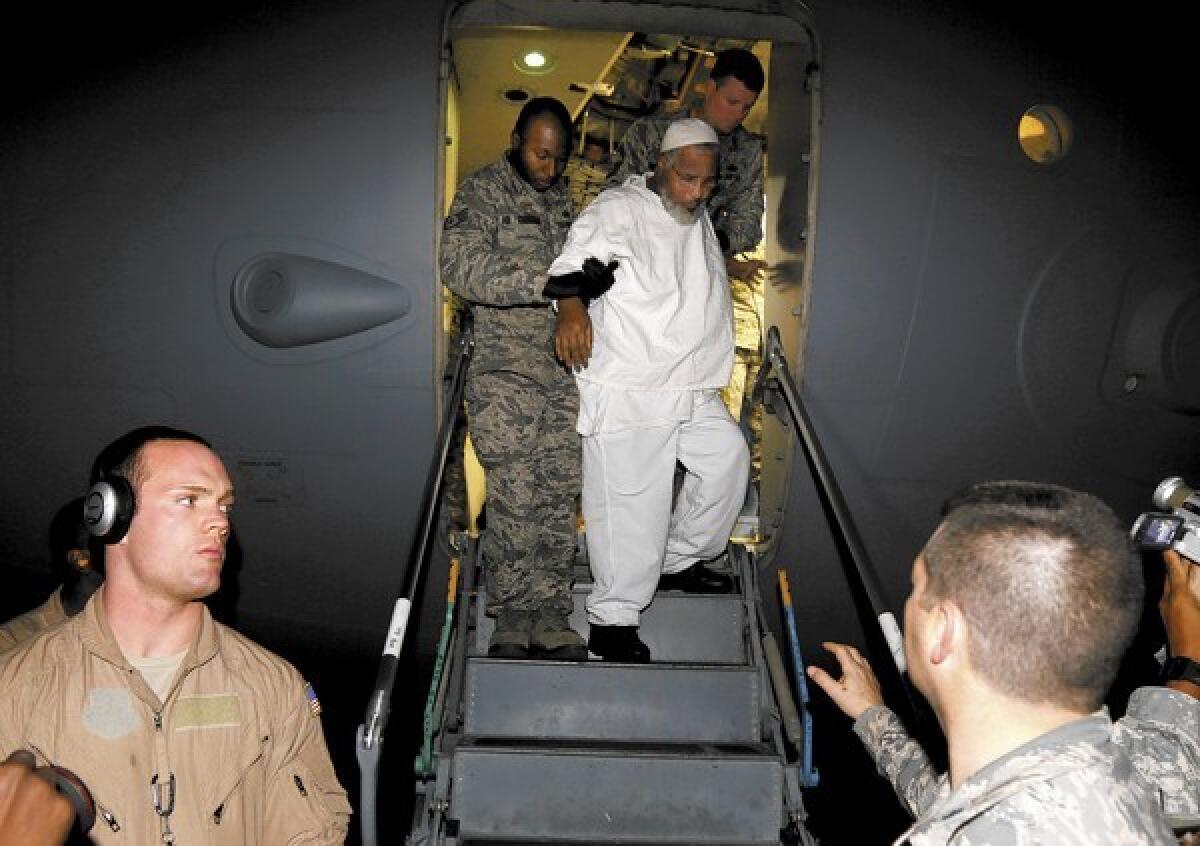Measure would return more Guantanamo detainees to home countries

- Share via
WASHINGTON — As many as half of Guantanamo Bay’s 158 detainees could be transferred from the U.S. prison to their home countries under a provision in the annual National Defense Authorization Act, which Congress was expected to approve late Thursday.
Human Rights First, a civil rights advocacy group, called the law “a significant step forward” in opening the jail doors for scores of detainees and perhaps someday closing the facility at the U.S. naval station at Guantanamo Bay, Cuba.
The provision, which was included in the annual law that sets overall Pentagon spending and policies for the coming year, would expedite the review process for releasing terrorism suspects and set up safeguards to ensure that former detainees do not resume terrorist activities and are not mistreated when they return home.
The Obama administration has pledged to close the prison. Caitlin Hayden, spokeswoman for the National Security Council, said the measure provides “additional flexibility to transfer detainees abroad consistent with our national security interests.”
She said it was difficult to say exactly how many detainees would be transferred out of the Guantanamo prison, set up after the Sept. 11, 2001, terrorist attacks.
“The president has directed the administration to responsibly reduce the detainee population to the greatest extent possible, and we would welcome much needed flexibility in this area,” she said.
The administration’s chief concern, she said, is ensuring that former detainees no longer pose a threat and that they receive “humane treatment” once they are returned. None will be transferred to the U.S.
Staff members at Human Rights First, which has closely monitored the situation, said as many as 79 detainees already cleared for transfer could be released, reducing the prison population of 158 by half.
A key change in the law is that a set of “risk factors” will be used to evaluate potential releases, balanced against U.S. security interests. Critics say the current certification process takes too long and often fails to prevent detainees from resuming terrorist activities upon release.
Sen. Dianne Feinstein (D-Calif.), chairwoman of the Senate Intelligence Committee, lauded the new measure, noting that detainees cleared for transfer who remain at the prison do so “at great expense to the taxpayer [and] continue to damage our reputation as a champion of human rights.”
“I strongly believe it is time to transfer these detainees out of Guantanamo and close the prison once and for all,” she said.
The administration announced Wednesday night that two longtime detainees had been released and returned to their home country, Sudan.
The U.S. “coordinated with the government of Sudan regarding appropriate security measures and to ensure that these transfers are consistent with our humane treatment policy,”
The men were identified as Noor Uthman Muhammed and Ibrahim Othman Ibrahim Idris.
In February 2011, Muhammed pleaded guilty to providing material support to Al Qaeda and conspiracy to provide material support to a terrorist organization and terrorism. He was sentenced to 14 years’ confinement. In exchange for his guilty plea and cooperation with U.S. authorities, officials suspended all but 34 months. He had finished that sentence as of Dec. 3 and was returned to Sudan.
A senior Al Qaeda trainer, Muhammed was captured by Pakistani forces in March 2002 along with nine other Al Qaeda operatives, including senior leader Abu Zubaydah.
Idris, who has been cleared for transfer since 2009, was released from Guantanamo under a federal court order issued Oct. 4 in Washington. The Guantanamo Review Task Force had recommended his transfer in January 2010, but it was delayed while U.S. officials conducted what they called a “comprehensive review of Idris’ case, including security issues.”
Idris served as a close aide and international courier for Al Qaeda leader Osama bin Laden. He was seized in December 2001 along with 30 other Al Qaeda fighters after combat with U.S. forces in the Tora Bora mountains along the Afghan-Pakistani border.
Even with the new law, some detainees will remain at the base. Among them: Khalid Shaikh Mohammed, accused of masterminding the Sept. 11 attacks, and four men accused of being conspirators. They face military prosecution.
aw, some detainees will remain at the base. Among them: Khalid Shaikh Mohammed, accused of masterminding the Sept. 11 attacks, and four men accused of being conspirators. They face military prosecution.
More to Read
Sign up for Essential California
The most important California stories and recommendations in your inbox every morning.
You may occasionally receive promotional content from the Los Angeles Times.













